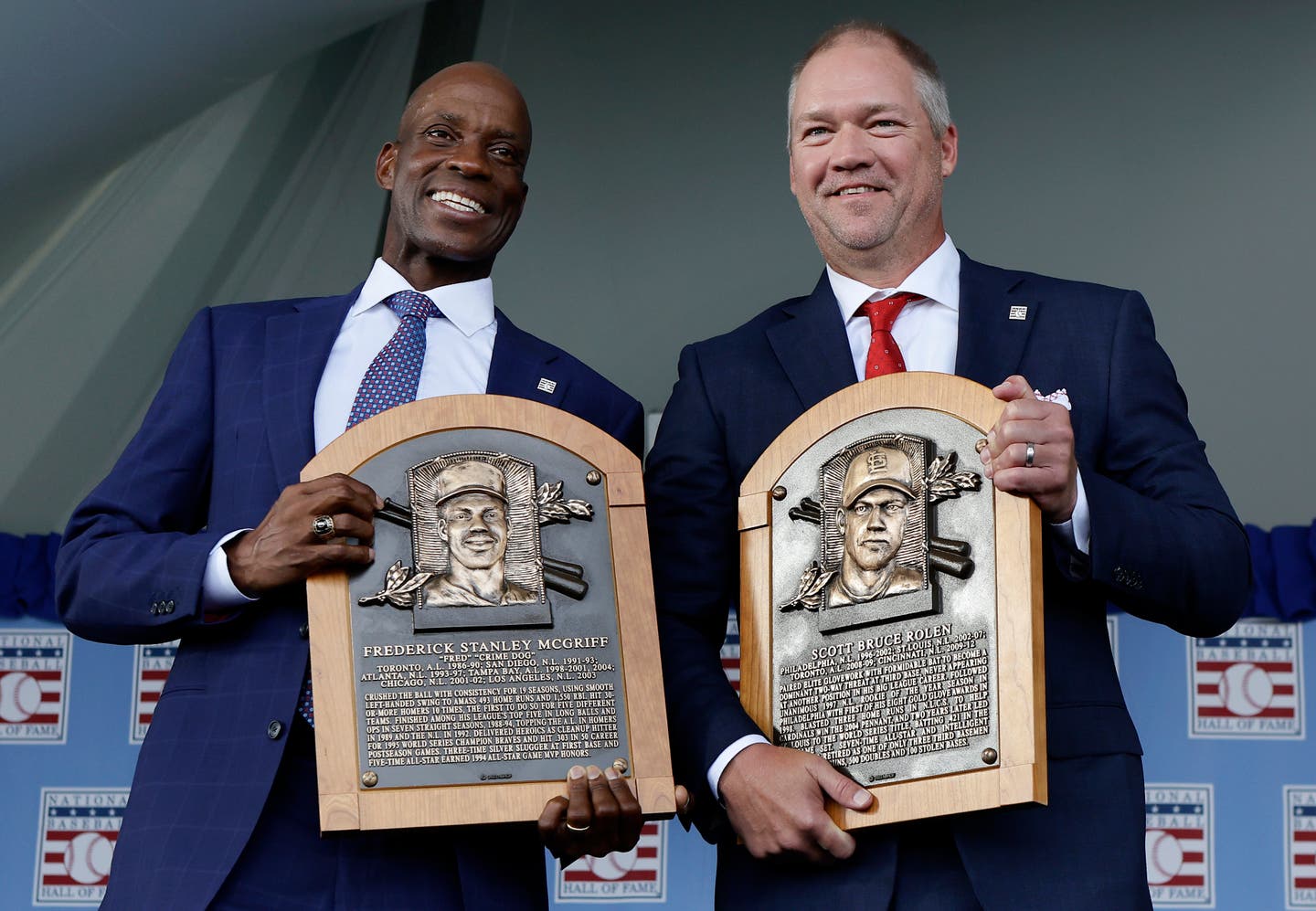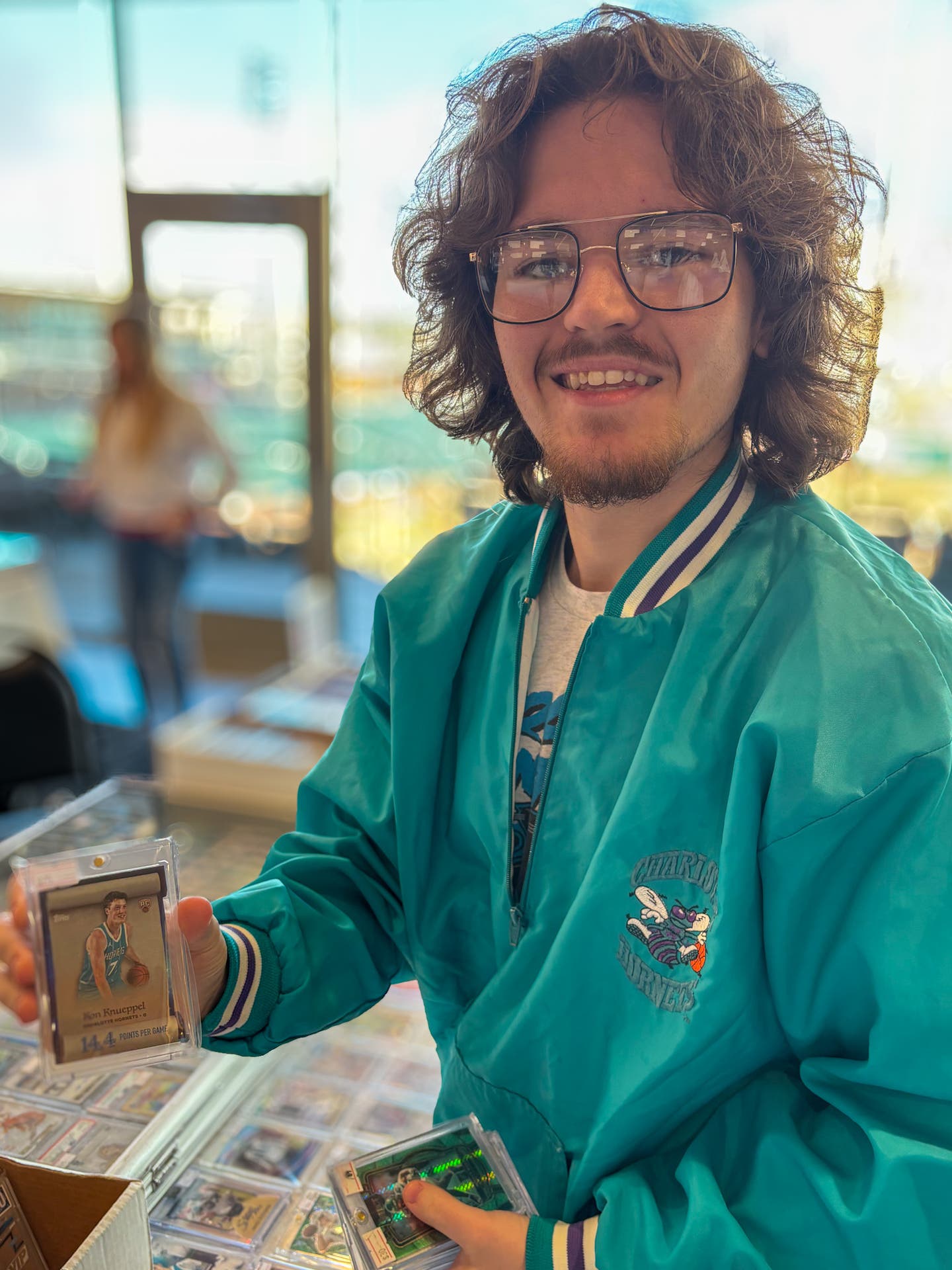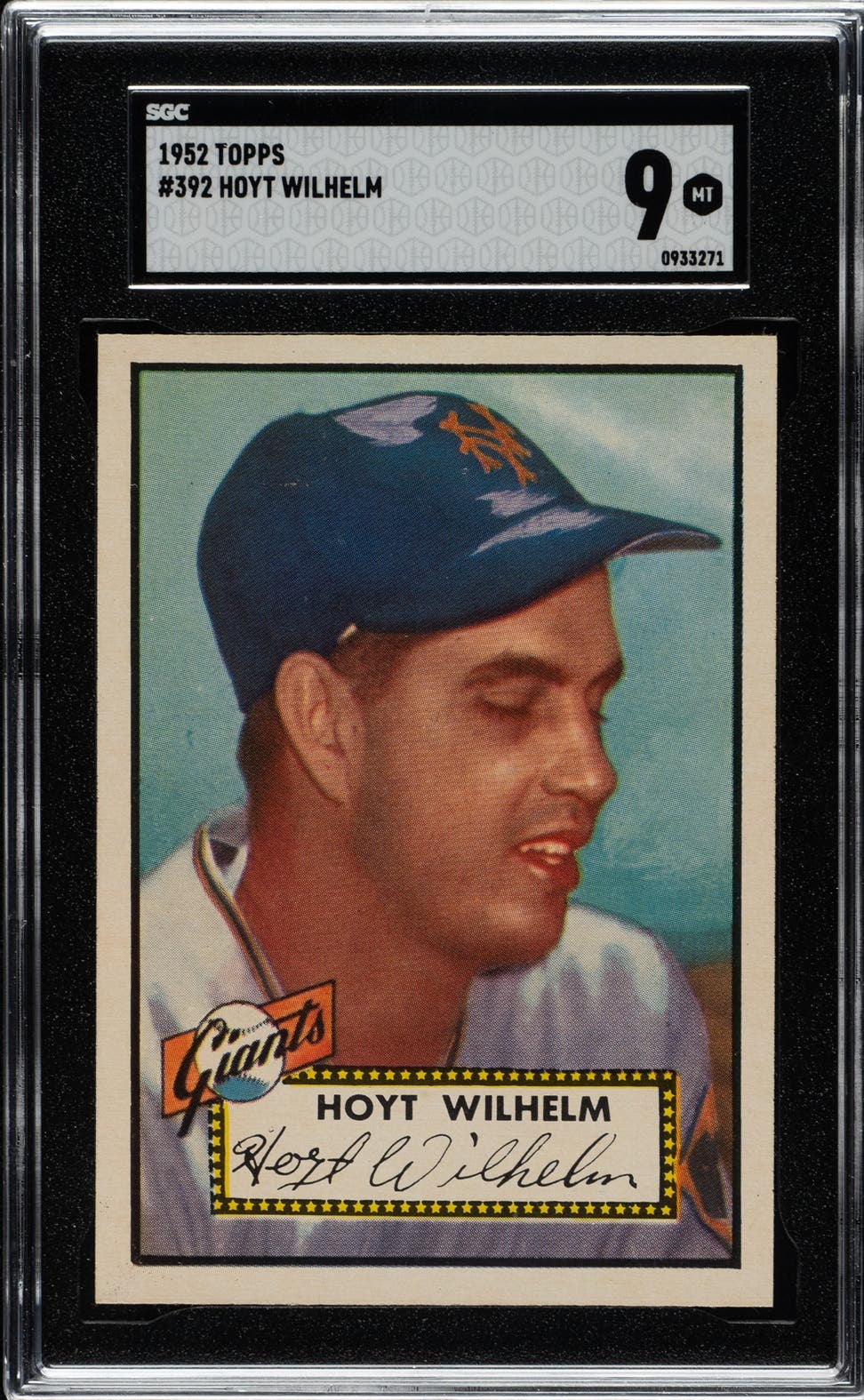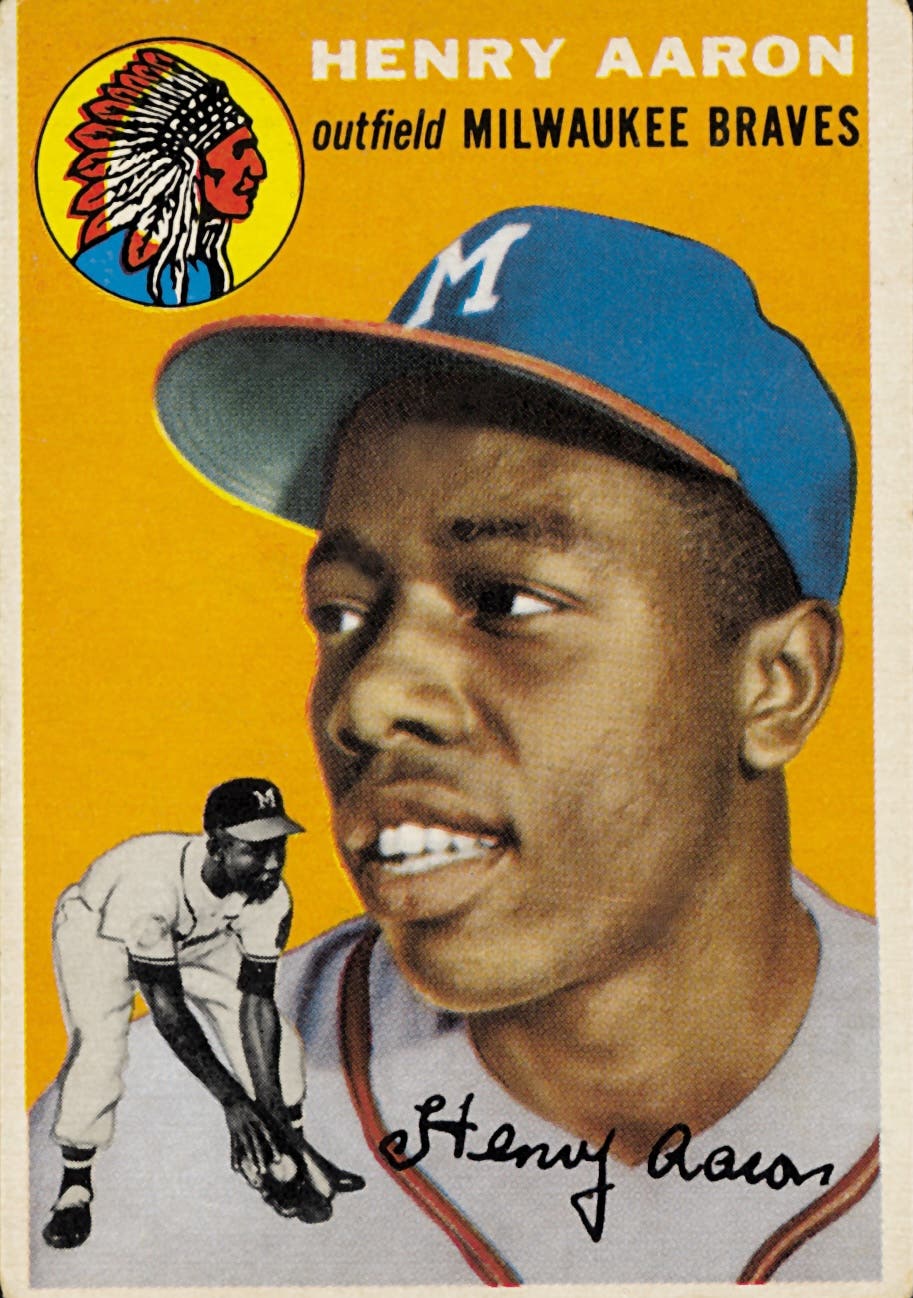
News
Fred McGriff, Scott Rolen finally get their due in emotional Baseball Hall of Fame inductions
There may be no crying in baseball, but you can get pretty emotional at times, especially when one of the game’s new Hall of Famers thanks his wife for being at his side “ever since we worked together at Burger King,” and another one tips his cap to his mom.
That’s the kind of day it was when former big-league first baseman Fred McGriff, followed by third baseman Scott Rolen, were inducted into baseball’s shrine in Cooperstown, N.Y. on a picture-perfect Sunday afternoon on July 23.
As McGriff and Rolen took the stage at the Clark Sports Center just a short distance from the Baseball Hall of Fame, they were greeted by 50 baseball Hall of Famers. Thousands of fans cheered. In a spontaneous moment, a number of Hall of Famers just started shaking McGriff’s hand as he came onstage. The round of handshakes, which rarely happens during the onstage introductions, was seemingly in recognition of the former first baseman’s protracted path to the Hall, a journey many who played with and against the 19-year MLB veteran felt never should have taken so long.
But the affable McGriff didn’t let the 14 years it took for him to get to Cooperstown overshadow his Hall of Fame moment.
“Honestly, I would have been happy to play just one day in the major leagues,” the five-time All-Star said. “My goal was simply to make it to the big leagues.”
And make it he did.
The Tampa native hit 493 home runs during his MLB career, with 2,490 hits, 1,550 RBI and a lifetime .284 batting average while playing for six different teams — the Toronto Blue Jays (1986–90), San Diego Padres (1991–93), Atlanta Braves (1993-97), Tampa Bay Devil Rays (1998–2001 and 2004), Chicago Cubs (2001–02) and the Los Angeles Dodgers (2003).
The newly inducted Hall of Famer regaled the crowd about how he was cut from his Thomas Jefferson High School baseball team in Tampa when he was a sophomore. Not easily discouraged, McGriff worked hard to make the team as a junior.
He worked so hard that he became a good enough high school player to get drafted by the New York Yankees in the ninth round of the 1981 draft. However, he got off to a slow start in rookie ball, batting .148 with no home runs in 1981.
“That was quite the learning experience,” he said. “I went on a mission to improve as a hitter.”
The three-time Silver Slugger Award winner (1989, 1992, 1993) said getting into Cooperstown was a recognition of the hours he spent — literally thousands of them — becoming a better ballplayer.
“Heart,” McGriff said. “I always had a lot of heart. A computer can’t measure what is in someone’s heart.”
A throwback, McGriff is keenly aware that statistics don’t always gauge a player’s commitment to excellence.
The 59-year-old former first baseman said he will always be grateful to the New York Yankees for giving him a chance to pursue his dream. With a young, promising Don Mattingly poised to hold down the first base job for New York at the time, the Yankees decided to trade McGriff to the Toronto Blue Jays in 1982.
During the HOF induction ceremony, McGriff recalled that he was thrilled that the Blue Jays saw his potential. He believed that if an organization “trades for you, you know you’ve got a chance [to make it to the big club].”
It took another four years for the left-handed slugger to get to the big leagues, but he remembered the day it happened.
“May 18, 1986,” he said, flashing his trademark smile.
The first people he called when he learned that he had made it to the Bigs were his mom and dad — Eliza and Earl McGriff.
“Mom was a schoolteacher. Dad ran a TV repair shop. They were my number one fans,” he said.
In his first major league at-bat, in the bottom of the second inning against Cleveland hurler Don Schulze, a young McGriff got a single up the middle.
“That was the moment I started living my dream,” the All-Star said with breathtaking exuberance, as if he had just gotten that hit. “And, yes, I still have the ball.”
Thinking back on fond memories. McGriff said all the ushers and concessioners in Toronto knew his mother.
“They all knew Mrs. McGriff,” he said. “She let everyone know who her son was. I’d walk around the ballpark and the workers would call to me: ‘I saw your mom or I talked to your mom today.’”
McGriff made much of his induction speech about family and what his family meant to him, which is when he recalled working with his wife Veronica at a fast-food restaurant when they were very young.
Since that time, he said, “She prayed for me every step of the way.” And then, looking at his teary-eyed wife, he added, “More than anyone, this honor is yours, too.”
A special touch came when Baseball Commissioner Rob Manfred read McGriff’s Hall of Fame plaque and referenced the revered player’s nickname, “Crime Dog,” which appears on the tablet. The major league great got the moniker because his last name sounded so much like the popular animated crime-fighting bloodhound McGruff, which the Ad Council and the National Crime Prevention Council used since 1980 to teach people about crime prevention.
McGriff had many memorable moments throughout his travels in the major leagues. Among his favorites is his time with Atlanta, where the Braves won the World Series in 1995.
“That was the first championship for the city of Atlanta. That is the proudest team moment in my career,” McGriff said.
McGriff was traded to the Braves from the Padres on July 18, 1993. In a now-famous story, he remembered that he was nursing a rib injury when he arrived at Atlanta’s Fulton County Stadium on July 20, and didn’t think he’d be in the lineup that night for the game against the St. Louis Cardinals. Amazed to see his name on the lineup card, McGriff felt he wouldn’t be ready to play.
But a fire broke out in the stadium’s press box and delayed the game for several hours. That delay gave the Braves’ trainers time to work on McGriff’s sore rib and prepare him for the game. The Braves were trailing early, but by the bottom of the sixth inning, McGriff had clearly recovered. Using his famed swing with the helicopter-style follow-through, he homered to tie the game at 5 and the Braves went on to win 8–5.
That story is always told when speaking about McGriff’s career. So it seemed only fitting that at the end of his induction speech, McGriff told the crowd, “Always be true to who you are. There will be fires along the way. But those fires can ignite the spark for the next season of your life.”
TWO-WAY THREAT
Scott Rolen put out many fires with his play at third base. So many, in fact, that his Hall of Fame plaque starts out with this wording: “paired elite glove work with formidable bat to become a dominant two-way threat at third base.”
The pride of Jasper, Ind., Rolen played 17 years in the big leagues with four teams — the Philadelphia Phillies (1996–2002), St. Louis Cardinals (2002–07), Toronto Blue Jays (2008–09) and Cincinnati Reds ( 2009–12). He won eight Gold Gloves and was unanimously elected Rookie of the Year in 1997. Rolen had 316 home runs and 517 doubles in addition to 118 stolen bases, with a lifetime .281 batting average.
But it was his glove work — fielding the bunt, throwing off-balance or on the run, and zealously guarding the hot corner — that made him the envy of every team in the majors. Rolen never played any position other than third base during his major league career.
Also See: Celebrating Cardinals legend Stan Musial
A Silver Slugger Award winner in 2007, Rolen thanked the members of the Baseball Writers Association of America for voting him into the Hall.
“At no point in my lifetime did it ever occur to me that I would ever be standing on this stage,” he said. “But I’m glad it occurred to you. Because this is unbelievably special.”
During his induction speech, Rolen thanked all the organizations he played with, but, in particular, singled out the Phillies “for teaching me how to play with a genuine effort and honesty on the field.”
“I was drafted, was developed, was given the opportunity, and was challenged to play with full effort and a toughness that I hope middle infielders felt deep inside on a double-play ball.” That learning experience in the Phillies’ organization, he said, helped guide him throughout his major league career.
Additionally, he cited the St. Louis Cardinals, where he won four division titles (2002, 2004, 2005 and 2006), two National League championships (2004 and 2006) and a World Series (2006). He gave a shout-out to the Cardinals’ unconditionally loyal fans. His time with the Cardinals also stands out because that’s the team he was with when his two children were born.
Rolen recalled how his life was built around strong family ties and his desire to play major league baseball.
“My role models lived in the same house as me,” he said, pointing out his mother, father and older brother and sister, who were in the crowd cheering him on. His passion for being a major league baseball player started at a very young age.
“The first day of kindergarten, my mom picked me up and asked me how my day was. I told her, ‘It was fine. Everyone was nice. But I think I’ll stay home from now on and just practice baseball,’” said the seven-time All-Star.
The 48-year-old Rolen said the greatest moment of his career happened during his major league debut. He was called up to the Phillies on Aug. 1, 1996. It was a scorching hot day at Philadelphia’s Veterans Stadium, where the Phillies were playing the Cardinals in a doubleheader. His parents, Ed and Linda Rolen, were on vacation in Florida and drove all night to be at the game.
“In the top of the fourth inning I see from my position at third base, my mom and dad walking to their seats,” he recalled. “It was a feeling that was never topped in my 17 years in the big leagues.”
He talked about a childhood surrounded by sports, hard work, and playing baseball with friends.
“I had a simple childhood. Then I got drafted by the major leagues. So began 20 years of hypertension and acid reflux that I would trade for nothing,” he said.
Known as a hard-nosed player who would not be outworked on the baseball field, Rolen told the crowd in Cooperstown how he developed that intensity.
“It was something my father said to me and it was about basketball, not baseball,” said Rolen, an outstanding basketball player in high school as well as a baseball player. Indiana, of course, is a basketball-driven state.
Every year in the late spring, Rolen said, there was a series of two games played between Indiana high school all-stars and Kentucky high school all-stars. Rolen was selected for the Indiana team, but he hadn’t played basketball for months, having decided to put his time and effort into baseball. The Indiana team held a few practices and Rolen was concerned. He was out of condition for basketball. So he sought out his father’s advice.
He said he told his father that he couldn’t handle the ball or shoot the ball and, because he was so out of condition when it came to basketball, everyone at the practice, including the coach, could outplay him.
“‘Well,’ my dad said, ‘you told me what you can’t do. What can you do?’” Rolen said, retelling the story. “I said, ‘I can rebound, play defense, dive for the loose ball. And it doesn’t appear as though the guys are playing very hard, so I can out-hustle and outwork them and beat everyone up and down the floor.’”
Rolen said his dad’s response was, “‘Well, do that then.’”
That simple mantra came to symbolize the way Rolen played during his major league career.
“From that point on I decided I would never be unprepared or outworked. ‘Well, do that then’ put me on this stage today. Thank you, Dad.”
One of Jasper’s favorite sons, Rolen said that basketball lesson taught him that “effort never takes a day off.”
The Gold Glove infielder gave his mom credit for coming to his big-league home games and wishing him good luck from the stands.
“At the start of the game, as the ball was being thrown around the horn and I then waited to hand the ball to the starter, Mom would wave to me from the stands and, in acknowledgment, I tipped my hat back,” he said.
At the end of his induction speech, Rolen tipped a Hall of Fame baseball cap to his mom and his whole family.








